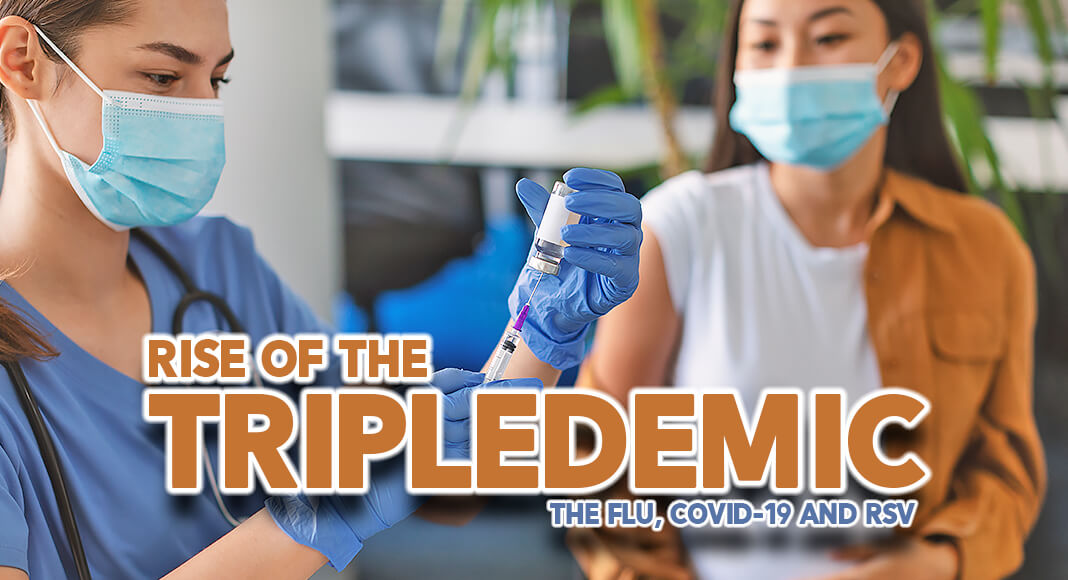
Mega Doctor News
CEDARS SINAI – As the new year kicks into full swing, so has a trio of respiratory viruses, creating a so-called tripledemic. The flu, COVID-19 and RSV (respiratory syncytial virus) are sending more people to the doctor’s office—or even the hospital—and sometimes combining to make matters worse.
“We’ve had patients come into our clinics testing positive for both COVID and flu,” said Caroline Goldzweig, MD, chief medical officer of the Cedars-Sinai Medical Network. “Having one doesn’t protect you from the other.”
Goldzweig said Cedars-Sinai’s primary care and urgent care offices have seen a steady rise in respiratory viruses since November. Their percentage of positive COVID-19 tests has doubled since then, rising to 14% of tested patients by the end of December.
The percentage of positive influenza tests in Los Angeles County more than doubled to almost 23% by the end of December. RSV, which mostly affects younger and older patients, peaked late in November, but 10% of tests for the virus in Los Angeles County are still positive.
Cedars-Sinai Medical Center also has seen a steady rise of COVID-19 patients since Thanksgiving, although these patients still remain a fraction of those cared for in the hospital’s 915 beds. Flu has followed a similar pattern.
Priya Soni, MD, a pediatric infectious disease specialist with Cedars-Sinai Guerin Children’s, has treated many young children and infants who have not yet been vaccinated against COVID-19 and come to the hospital needing oxygen. She recommends that babies get the COVID-19 vaccine when they’re eligible, starting at 6 months of age.
RSV also is dangerous for young infants. Expectant mothers should consider getting not only the updated COVID-19 vaccine but the newly available RSV vaccine as well, Soni said, if they’re going to deliver during respiratory virus season “so that the antibodies can protect your infant during their youngest and most vulnerable few months of life.” This is especially important because a new RSV immunization for infants is in short supply.
Soni added that it’s not too late for people of all ages to get the updated COVID-19 vaccine, especially with the further increase in cases experts are predicting over the next couple of weeks. It’s also not too late to get the flu shot. This year’s formulation is very effective against circulating influenza strains. A new RSV vaccine is also available for adults over 60, with the greatest benefit for those who are at higher risk because of chronic medical conditions.
“Remember to mask,” Soni said. “It’s a really effective way to protect yourself in very crowded situations and when you have a vulnerable family member.”
But Wait, There’s More
If a tripledemic weren’t bad enough, a fourth illness—superimposed bacterial infection—has been exacerbating an already challenging virus season, landing vulnerable patients in the hospital, said Soniya Gandhi, MD, associate chief medical officer at Cedars-Sinai.
“When you have these viral infections, there is a risk of superimposed bacterial infection,” said Gandhi, an infectious disease specialist. “And we have seen a rise in pneumococcal pneumonia as a superimposed bacterial infection on top of the viral illness.”
Still another culprit has been appearing in Cedars-Sinai’s outpatient clinics. Goldzweig said the staff members have seen many patients with viral gastroenteritis, a stomach bug causing nausea, vomiting and diarrhea. The virus spreads through contact, likely making the rounds at holiday meals. Avoid it by not sharing food and washing hands after eating or visiting the bathroom.
Get Tested, Get Treatment
Flu, RSV and COVID-19 all share similar cold-like symptoms—nasal congestion, headaches, fatigue—plus muscle aches and fever. But it’s important to get tested to determine which virus, or viruses, might be causing symptoms.
“There’s no way to tell specifically what you have without getting tested, so it’s incredibly important to get tested early on during your illness because there may be specific treatment options depending on what you have, as well as specific recommendations regarding isolation and keeping you and your loved ones safe,” Gandhi said.
Gandhi said patients with COVID-19 may qualify for Paxlovid, which needs to be taken within five days of symptom onset or as soon as possible to be effective. Similarly, those with the flu might be prescribed Tamiflu, which must be taken within 72 hours of diagnosis to be effective.
For those who don’t know whether their sniffles or sore throat require a trip to the doctor, a virtual appointment can be a convenient first step. Adult patients in California can use Cedars-Sinai Connect, a new mobile app that provides quick access to Cedars-Sinai experts, who are available 24/7 for urgent issues. Same-day appointments also are available on the platform for primary care
Mild symptoms can be managed virtually, Goldzweig said. Providers might recommend using a self-testing kit for COVID-19 or refer a patient for in-person testing or labs. Or they can follow up with a prescription if needed or advise on supportive care (fluids, Tylenol) to help patients manage symptoms at home. Goldzweig said patients with more serious symptoms—ongoing inability to tolerate food or fluids or prolonged dizziness—should visit urgent care.
For parents who want to prepare ahead of time for the possibility of a sick child, Soni recommends keeping a few things on hand: a humidifier to ease congestion and cold-like symptoms and a nasal suction device and saline solution to help clear mucus from a viral infection.
And all season long, she says, we should all “hydrate, hydrate, hydrate.”
Read more on the Cedars-Sinai Blog: COVID-19 and Flu Shots Provide a Double Dose of Protection










